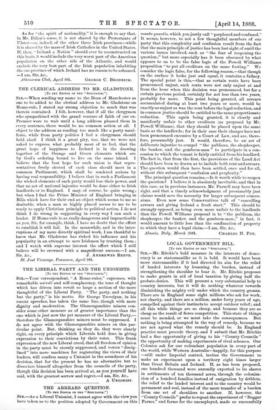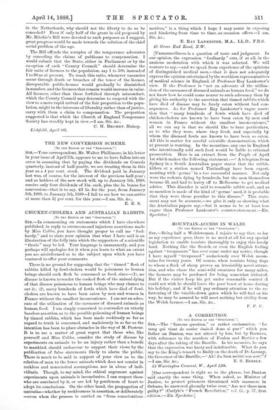LOCAL GOVERNMENT BILL.
[To THE EDITOR OF THE "SPECTATOR.'] Sin,—Mr. Ritchie's bold measure in the interests of demo- cracy is as statesmanlike as it is bold. It would have been more statesmanlike if it had directed its aim for the relief of landed interests by lessening the burden, instead of strengthening the shoulder to bear it. Mr. Ritchie proposes to make grants in aid of local taxation by giving half the probate-duties. This will present a very substantial help to- country interests, but it will do nothing whatever towards diminishing the mighty evil under which the country groans. There are in England some eight millions who ask for work, not charity, and there are a million, under forty years of age, compelled against their instincts to accept outdoor relief ; and all this while things are so cheap, and because they are so• cheap as the result of fierce competition. This state of things must be mended, or we must take the consequences. But nothing is being attempted in the way of remedy, because we are not agreed what the remedy should be. In England practice must precede theory, and I submit that Mr. Ritchie• had a fine opportunity of giving to his " County Councils " the opportunity of making experiments of rival schemes. Our Colonies ask for our redundant population in every part of the world, while Western Australia—happily, for this purpose —still under Imperial control, invites the Government to make an experiment upon a territory eight times larger than Great Britain and Ireland. If as has been proposed, one hundred thousand were annually exported to its shores in settlements of ten thousand acres, through the colonisa- tion of a hundred families instead of emigration by driblets, the relief to the landed interest and to the country would be permanent and real, instead of the mere transfer of a burden from one set of shoulders to another. If, however, the "County Councils" prefer to repeat the experiment of "Beggar Farms," and farms for the unemployed, made so successfully
in the Netherlands, why should not the liberty to do so be conceded P Even if only half of the grant in aid proposed by Mr. Ritchie's Bill were devoted to such purposes as I suggest, great progress would be made towards the solution of the chief social problem of the age.
The Bill offends the scruples of the temperance advocates by conceding the claims of publicans to compensation. I would submit that the State, either in Parliament or by the co-option of each "County Council," should determine the fair ratio of licences to the population, say 1 to 500, instead of 1 to 80 as at present. To reach this ratio, whenever vacancies occur through death or breaches of the tenor of the licence, disreputable public-houses would gradually be diminished in number, and the licences that remain would increase in value. All licences, other than those forfeited through misconduct, which the County Council may determine to suspend with the view to a more rapid arrival of the fair proportion to the popu- lation, might in the interests of liberality rather than of justice, carry with them a claim to compensation. The proportion suggested is that which the Church of England Temperance Society has steadily kept in view.—I am, Sir, &c.,



































 Previous page
Previous page